Colombia Strikes Physical Exam Requirement for Gender Change
Ten transgender Colombians will today be the first people to take advantage of new rules that simplify the process by which individuals can legally change their gender. The decree, which was signed by the Ministry of Justice and the Ministry of the Interior and went into effect last Friday, eliminates the need for psychiatric or … Read more
FARC and Colombian Government Agree to Truth Commission
On Thursday, the Fuerzas Armadas Revolucionarias de Colombia (FARC—Revolutionary Armed Forces of Colombia) guerrillas and the Colombian government announced an agreement to establish an independent truth commission to investigate human rights violations committed during Colombia’s 50-year internal conflict. The 11 anticipated commissioners, to be elected by a seven-member committee, will carry out investigations for a … Read more
Monday Memo: Marches in Venezuela—Guatemalan Protests—Chilean Education Law—Transgender Inmates in Rio—Colombian Murder Trial
Thousands Amass in Venezuela for Anti-Government Protest: Nearly 3,000 Venezuelan demonstrators clothed in white marched in Caracas on Saturday in the largest protest since last year’s surge of anti-government demonstrations. In a video filmed from his jail cell prior to the protests, former opposition Mayor Leopoldo López encouraged supporters to protest peacefully to demand the … Read more
Colombia Recognizes Sexual Violence Victims
On Monday, Colombia commemorated the first annual National Day for the Dignity of Female Victims of Sexual Violence caused by the Internal Armed Conflict in an effort to highlight the toll the country’s ongoing conflict has taken on women. Colombia’s National Victims Registry estimates that during Colombia’s five-decade-long civil war, members of armed rebel groups … Read more
The Next Chapter for China in the Americas
Chinese Premier Li Keqiang begins an eight day trip to South America today, landing in Brazil with a promise of some $50 billion in Chinese investments in Brazilian infrastructure. This trip follows on and is consistent with the promise that President Xi Jinping made in January to invest $250 billion in Latin America and the Caribbean … Read more
La guerra es contra el glifosato
Más de 20 mil firmas alcanzó en pocos días la petición hecha en la plataforma Change.org para acabar con la fumigación con glifosato de cultivos ilícitos en Colombia. La abogada ambientalista Astrid Puentes Riaño de la Asociación Interamericana para la Defensa del Ambiente (AIDA), autora de la iniciativa, espera recaudar 25 mil apoyos antes de … Read more
Monday Memo: Castro visits Pope—Chilean Cabinet—Colombian Coca—Guatemalan Corruption—Central American Geothermal
This week’s likely news stories: Raúl Castro has an audience with the Pope; Michelle Bachelet shakes up her Cabinet; Colombia bans coca spraying; a Guatemalan judge is linked to a corruption scandal; Germany will invest in Central American geothermal projects. Cuban President Meets with the Pope: Cuban President Raúl Castro met with Pope Francis this … Read more
Sixty Percent of Latin Americans Will Have Internet Access in 2016
The number of Latin Americans with access to the Internet will increase by 20 percent over the next twelve months, according to the Latin American and Caribbean Internet Address Registry (LACNIC). The Uruguay-based NGO is one of five Regional Internet Registries in the world that assigns and administers IP addresses to local Internet service providers—it also advocates for Internet development in … Read more
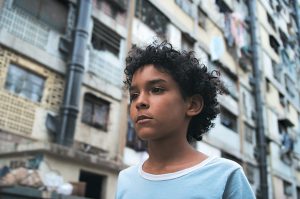
Film Review: Pelo Malo
As his mother, Marta, pounds on the bathroom door, nine-year-old Junior stares at himself in the mirror, slicking his hair back with water in an effort to undo his tight curls. Junior’s determination to straighten his hair so he can look like his idol, Venezuelan rock star Henry Stephen, is an ongoing source of tension … Read more
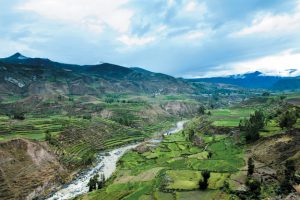
10 Things to Do: Arequipa, Peru
Peru’s second-largest city, Arequipa has been a breeding ground for rebels and intellectuals since its founding in 1540. Among its famous residents is Nobel Laureate Mario Vargas Llosa. The rich architecture of this UNESCO World Heritage site is worth the long journey from Lima. All prices are in U.S. dollars. 1. Treat yourself to a … Read more
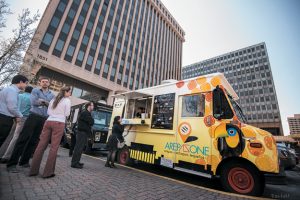
Spreading the Arepa Love
Over the past decade, hungry U.S. diners have increasingly grown to love the Venezuelan take on a popular dish introduced by Latin American immigrants: grilled cornmeal patties called arepas that are stuffed with everything from cheese to pork to fried plantains. New York City has at least one Venezuelan restaurant serving arepas in each of … Read more
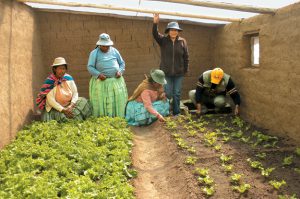
Civic Innovator: Rosmery Mollo Mamani
Rosmery Mollo Mamani’s great-grandmother died in childbirth. It is an all-too-common tragedy in the Bolivian altiplano (plateau), where Indigenous women experience the country’s highest rates of maternal mortality. But Mollo refused to accept that fact as inevitable. At the age of 19, she left her Indigenous community in the province of Ingavi to pursue a … Read more
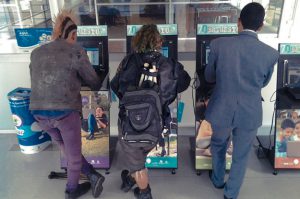
Medellín, The Smart City
Expectant mothers in the poorest areas of Medellín, Colombia, once had to travel far from their neighborhoods for doctor appointments—often spending more money than they earned in a day on transportation. But thanks to the Buen Comienzo (Good Start) program provided by the city government’s Medellín Ciudad Inteligente (Medellín Smart City) initiative, mothers-to-be in the … Read more

Silicon Valley 2.0
Not too long ago, in a city known for its sunshine and surrounding mountains, a team of young developers submitted their newest creation to Apple’s app store. It was called Typic. Beautiful in its simplicity, it offered a means of artistically embedding text in a photo, along with various filters and other options. After the … Read more
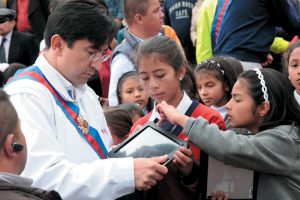
Colombia’s Internet Advantage
We are at the center of a revolution. The social, cultural and political changes triggered by the development of information and communications technologies (ICTs) that were unforeseeable just a couple of decades ago are now an undeniable reality. As our children and grandchildren are keen to remind us, once-transformative technologies such as fax machines and … Read more


